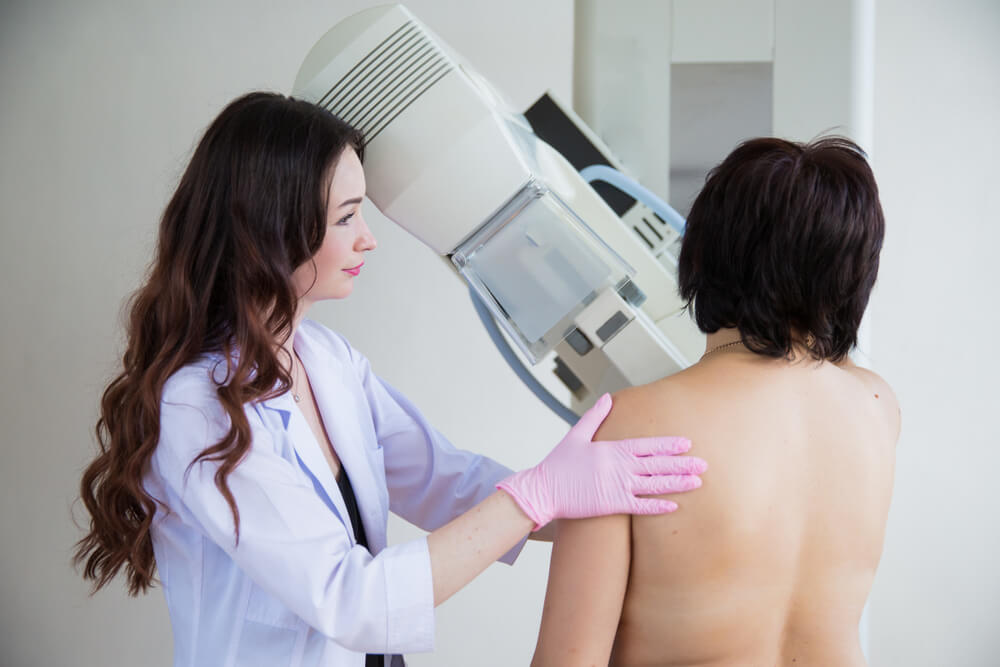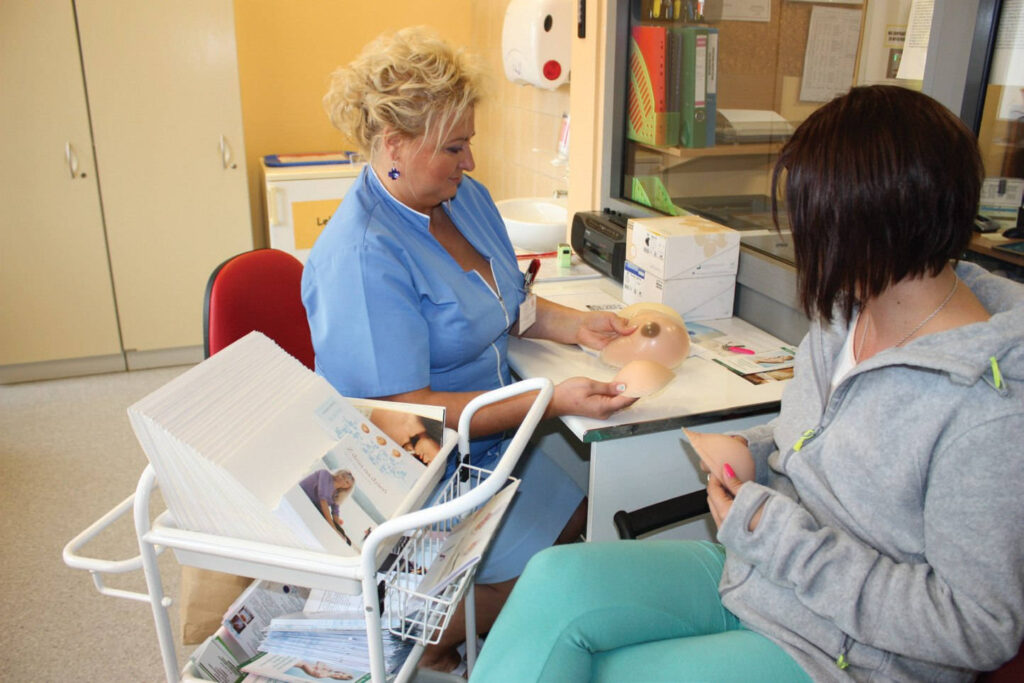Clinical Department of Breast Cancer and Reconstructive Surgery

Established in 1999, the Clinical Department of Breast Cancer and Reconstructive Surgery (at that time known as the Department of Breast Diseases) is the oldest organ centre of this type in Poland. The innovative concept of its establishment refers to the idea of organizing a network of centres dealing with diagnostics and comprehensive treatment of patients with breast cancer (Breast Cancer Unit) developed in the countries of Western Europe and North America. Systematic professional development of the team at our department and other organizational units of the Oncology Centre in Bydgoszcz cooperating with it, enabled the accumulation of extensive experience and multidisciplinary skills in the effective treatment of our patients. The summary of the efforts involving the diagnostic, therapeutic and organizational activities of the department was the receipt of the International Breast Cancer Unit (BCU) Diagnostic and Treatment Certificate in 2017.
Currently, the department provides surgical treatment for over 1,200 patients with newly diagnosed breast cancer (it is the highest result in this respect in Poland). The effect of the latest trends in the treatment of breast cancer used by us are very good long-term results of anti-cancer treatment, comparable to those achieved in the World’s leading oncology centres. The estimated 5-year survival rate is as high as 97% in stage I of the disease, 71% in stage II and 67% in stage III. According to the analysis of the place of residence of patients, more and more of them are people reporting to our centre from outside the Kuyavian-Pomeranian Voivodeship (in 2006 it was 11.6% of patients, in 2020 – as much as 17.3%).
The most important principle of our operation is the greatest possible personalization and safety of the treatment offered to patients. Recognising the enormous gravity of the passage of time and the need to act quickly, we provide patients who come to the Oncology Centre with the shortest possible period of performing the necessary diagnostic procedures. They include the current recommendations of experts and scientific societies. After determining the clinical stage of the cancer, based on decisions made in a multidisciplinary therapeutic team, we determine the optimal therapeutic procedure for each patient. The complexity of treatment takes into account multidisciplinarity, including rehabilitation, different types of psychological and social support, and the ongoing cooperation of experienced specialists. This results in excellent both early and long-term treatment results.

In addition to surgical treatment of malignant neoplasms of the mammary gland, we also perform surgeries in patients diagnosed with precancerous lesions and benign tumours.
Due to the highest degree of referentiality, our department conducts specialist training in the diagnosis and treatment of diseases of the mammary gland for doctors specializing in general and oncological surgery, obstetrics and gynaecology as well as oncological gynaecology.
We are an integral part of the Department of Oncological Surgery of Collegium Medicum in Bydgoszcz of the Nicolaus Copernicus University in Toruń. We pay great attention to the scientific development of our team. This is reflected in numerous publications in peer-reviewed, high-ranking scientific journals, as well as through participation in various scientific research (also on an international scale) and conducting clinical trials.

|
Branch manager
Tomasz Nowikiewicz, MD, PhD, PhD in Health Sciences, prof. UMK
|
|
Head of Medical Care
mgr Beata Borzych
|
- a very high degree of use of surgical procedures of sparing treatment and oncoplastic procedures (in 2019, 65.7% of patients underwent breast-sparing treatment, while axillary lymph nodes-sparing treatment – 67.7% of patients),
- in the case of patients requiring breast amputation, we offer the possibility of performing reconstructive surgery at the same time,
- systematic reduction of the frequency of re-treatments related to the radicalization of previously performed surgical procedures (after the originally applied sparing treatment),
- the possibility of performing surgical procedures reducing the risk of breast cancer (so-called “prophylactic mastectomies”) – in the group of carriers of the BRCA1/2 gene mutation, with simultaneous breast reconstruction (procedures performed with the participation of a plastic surgery specialist),
- negligible number of local recurrences and other failures after surgical treatment,
- use of intraoperative radiotherapy and brachytherapy in cooperation with the Department of Brachytherapy,
- creating an organizational framework for the implementation of the possibility of performing highly specialized procedures in the field of reconstructive surgery (breast reconstructive procedures with the use of free tissue flaps, requiring microvascular anastomosis) and the treatment of chronic lymphoedema (microvascular anastomosis, lymph node transplantation),
- constant monitoring of qualitative indicators related to the treatment of patients (their detailed analysis and achieved changes are a constant topic of internal trainings).
Odwiedziny
- odbywają się codziennie w godzinach od 15.00-17.30,
- rekomenduje się wejście na oddział tylko 1 osoby odwiedzającej,
- osoby z objawami infekcji nie mogą odwiedzać pacjentów,
- przypominamy o obowiązku noszenia maseczki podczas całego pobytu w Centrum Onkologii
Przyjęcie do Oddziału
Izba Przyjęć znajduje się na niskim parterze w tylnej części Budynku Głównego. Z jej usług korzystają osoby skierowane do planowanej hospitalizacji oraz pacjenci leczeni w Centrum Onkologii, u których nastąpiło nagłe pogorszenie stanu zdrowia.
Pacjenci zgłaszający się do przyjęcia powinni mieć dowód osobisty lub inny dokument potwierdzający tożsamość.
Po rejestracji w Recepcji Izby Przyjęć chory udaje się do przebieralni, jeśli zachodzi taka potrzeba pielęgniarka/ sanitariusz pomaga choremu przy przebraniu się. Pacjent przekazuje okrycia wierzchnie rodzinie lub pozostawia je na przechowanie w depozycie szpitalnym. Na oddział docelowy chory udaje się sam lub jeśli zachodzi taka potrzeba jest zaprowadzony lub przewieziony przez sanitariusza Izby Przyjęć.
UWAGA!
Szpital nie ponosi odpowiedzialności za rzeczy pozostawione w szafkach przy łóżku chorego, dlatego też wszelkie wartościowe przedmioty (np. pieniądze, biżuteria, karty płatnicze) należy zostawić w domu lub przekazać do Depozytu Rzeczy Wartościsiowych mieszczącego się w Kasie Centrum Onkologii.
Co zabrać ze sobą do szpitala?
- leki oryginalnych opakowaniach + dokumentację medyczną + nagrania płyt z badaniami
- piżamę,
- ręcznik,
- kapcie, klapki pod prysznic,
- wygodne ubranie bawełniane np. dres,
- bieliznę osobistą,
- szlafrok,
- środki czystości (mydło, szampon, szczotkę i pastę do zębów, dezodorant)
- przybory toaletowe (grzebień, przybory do golenia itd.)
Co można zabrać:
- sztućce,
- kubek,
- wodę mineralną niegazową,
- kawę/herbatę,
- chusteczki higieniczne,
- środki higieny osobistej (podpaski),
- książki, czasopisma,
- telefon komórkowy + ładowarkę

